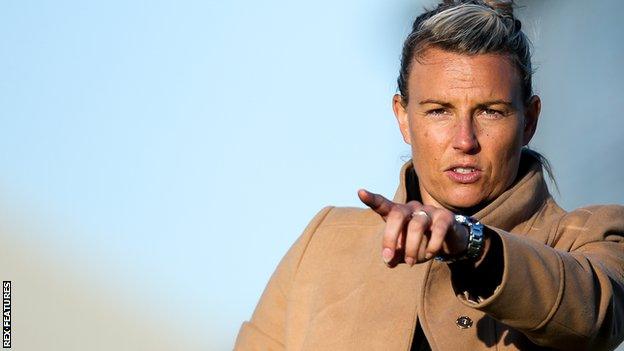Tanya Oxtoby: Bristol City Women boss can see 'signs' of depression in players
- Published

Tanya Oxtoby's Bristol City have not played a Women's Super League game since 23 February
Bristol City Women manager Tanya Oxtoby can see "signs" that some players are struggling with anxiety and depression during the coronavirus lockdown.
The Australian's comments come after a survey by world players' union Fifpro found the number of footballers reporting anxiety and depression symptoms had "risen sharply".
Last week, the Professional Footballers' Association said there had been a "spike" in the number of players in England seeking mental health support.
Before moving to England, Oxtoby, 36, worked as a government psychologist, external specialising in mental health for young people and indigenous Australians.
"Nobody has directly used that language, but using my background all the signs are there," Oxtoby, who graduated from the University of Western Australia, told BBC Sport.
"It's about trying to think outside the box in terms of how we support those players. Sometimes going head on with it and using that language isn't the best way to move forward.
"Linking in with the support network around them in a subtle way is probably the better avenue to go for.
"Sometimes just acknowledging that they're struggling a little bit, even without labelling it, is all they need - just so they're aware that you're aware."
Elite football in England has been suspended since 13 March and it remains uncertain how or when the season will be able to resume.
BBC Sport understands the Women's Super League campaign could be completed over a six-week period, with the remaining games played behind closed doors at one central base.
'Finances, families, illness - there's a lot of stress'
Fifpro's survey, carried out alongside Amsterdam University and published on Monday, showed 22% of female players and 13% of male players reported symptoms consistent with a diagnosis of depression.
Last week the PFA, which represents players in the WSL, said 299 footballers had accessed support in the first quarter of this year - compared to 653 in the whole of 2019.
"Athletes like structure, routine and to be around each other," said Oxtoby. "So I think from a mental point of view that's probably been very difficult.
"There's also obviously a lot of stress going on in terms of finances, families, illness and things like that too. And those are all factors that will affect individual players a little bit differently.
"We also probably went quite hard in terms of the physical training load in the first couple of weeks [of the lockdown], which takes a lot of self-motivation and can also have an effect on players."
She added: "It's just about trying to listen to them, I think. We've got an open-door policy and we've built that trust where if they're struggling they'll come and talk to us or the leadership group.
"We've had to listen to that really carefully over the past couple of weeks to make sure we get the balance right for them because it's all very, very stressful."